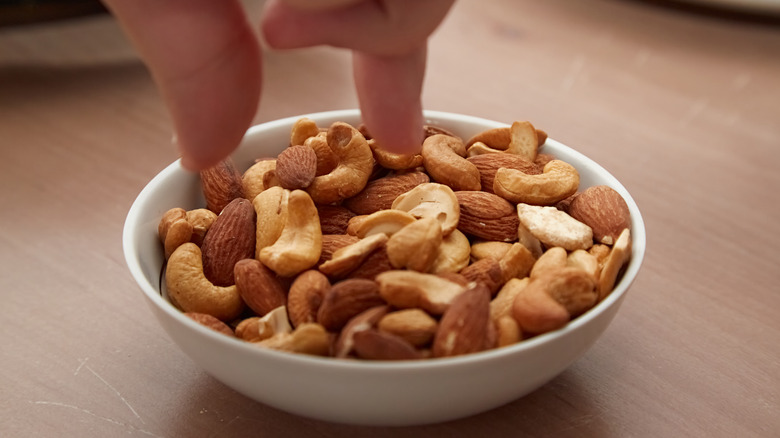Can Cashews Help You Lose Weight? The Answer Isn't What You'd Expect
Cashews are linked to a lot of health benefits. Not only do the nuts reduce low-density lipoprotein (LDL) cholesterol and decreasing the risk of heart disease, stroke, and diabetes, but they can also promote skin, hair, bone, muscle, brain, nerve, and gut health. Some of the benefits of eating cashews have even led to science claiming that cashews can reduce your risk of early death.
But when it comes to calories and weight gain, nuts like cashews have traditionally been thought to be a food you should avoid. This is mainly because of their high fat content, which, in turn, comes with high calories. But recent research has found that the methodology for counting calories in foods — using a method called the Atwater factors — may not universally apply to all foods, like nuts. The calculation, developed by chemist Wilbur Atwater, postulates that humans absorb four calories per gram of protein or carbohydrate and nine calories for every gram of fat that they eat.
But, research from a 2019 study published in the journal Nutrients found that calorie consumption from nuts can't be calculated in the same way. The research found that the actual calorie amount for cashews was about 16% lower than what was listed on the nutrition label. Therefore, you may be eating less calories than you thought when you grab a handful of cashews.
Why do cashews have less calories than once thought?
According to United States Department of Agriculture researcher David Baer, who co-authored 2019 study, the difference in calories could be attributed to the fact that not all of the calories in cashews are digested by the human body — especially those in the cell walls of the nuts. "Until we break open that cell wall, the things inside the cell aren't available for digestion," Baer explained to Triathlete.
This is why cashews could potentially help you lose weight — when consumed in moderation, of course. A 2018 study published in the European Journal of Nutrition of 373,293 men and women between 25 and 70 years old revealed that eating nuts frequently was linked with reduced weight gain and a smaller chance of becoming overweight or obese over the five year study period.
Other reasons why cashews make a good snack for those looking to lose weight are related to the nut's high protein, fat, and fiber content — all of which can help you feel fuller for longer. Nuts, like cashews, are also relatively expensive and "may not be consumed in excess in the way that cheaper energy-dense foods may be," as explained by Nutrition Communications Manager at British Nutrition Foundation, Bridget Benelam (via BBC Food). Furthermore, nut consumption has been linked with a boost in metabolism – which is another factor linked to weight loss.
What to know about eating cashews for weight loss
Eating too many cashews in a single sitting can potentially cause weight gain, so eating this nut in moderation is key. Plus, the kind, or form, of cashews you consume matters too. Cashew nut butters, for example, may not be exempt from the Atwater factors like the whole nuts are. This is because the grinding process manually breaks down the cells, which brings the fats out and develops that iconic, smooth texture. This makes the nut butters easier to digest and the calories to be more available than in whole nuts.
There are an array of different cashews that you can eat based on your dietary needs. For example, if you are consuming a low sodium diet, you may opt for unsalted cashews. You can also buy raw cashews from the store; these are steamed or boiled upon harvesting to remove the toxic urushiol content. You should limit your serving size to about an ounce a day to reap all the benefits of cashews, including potentially even slowing down aging.
That being said, cashews aren't for everyone. Those with nut allergies may experience a scratchy throat, hives, and swelling around the mouth if they accidentally ingest them. Moreover, people who are trying to avoid kidney stones may want to be mindful of the high oxalate content in cashews as well.


